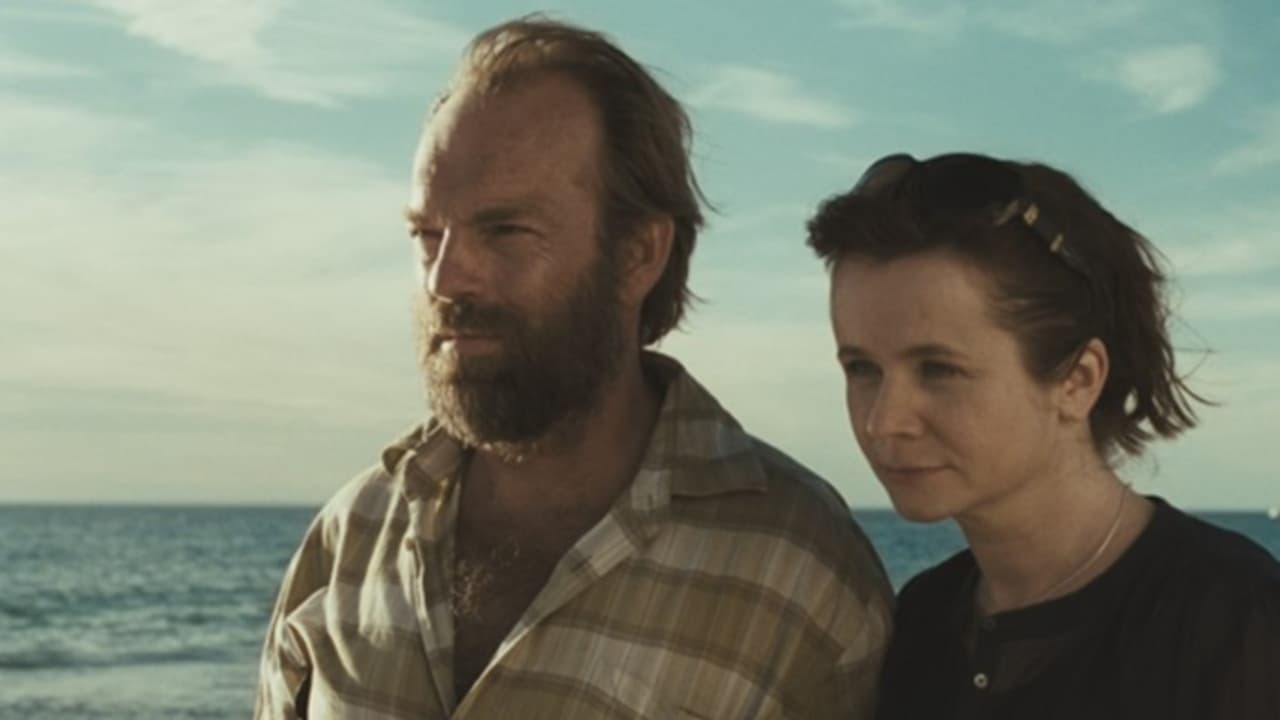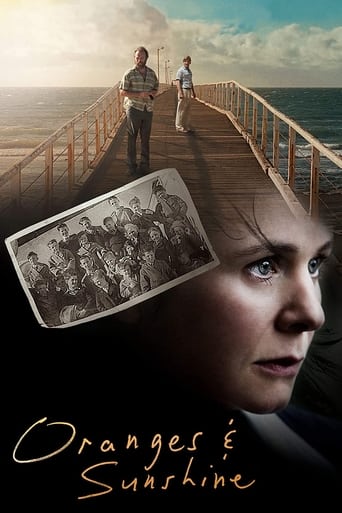Claysaba
Excellent, Without a doubt!!
CommentsXp
Best movie ever!
Orla Zuniga
It is interesting even when nothing much happens, which is for most of its 3-hour running time. Read full review
Keira Brennan
The movie is made so realistic it has a lot of that WoW feeling at the right moments and never tooo over the top. the suspense is done so well and the emotion is felt. Very well put together with the music and all.
Nicole C
The film took awhile to start off, and I almost switched it off. When I found out that it is based on a real story though, I got more intrigued. But, this was only possible when I decided to search it up on Google. A film that needs more explaining , and is better understood from the internet than from watching the film, makes it a hard watch. I would have guessed that it is made from a British company, but apparently it is from an Australian company. The reason I say this, is because American cinema likes to exaggerate and blow things out of proportion, while British films tend to be more subtle which also makes it hard to keep up with sometimes. In addition to the slow start of the film, I had a hard time comprehending the speech from some characters. Especially from Weaving, and the male characters in the film, who tended to murmur with their low voices. I couldn't catch what they said, and also, was not really that bothered by it. I didn't feel like I missed much, but only towards the end of the film did I realize I had missed some key elements. Again, this was rectified by online sources.However, there is a pretty strong cast. Watson shows her character's tenacity and dedication well, with good supports from her husband, played by Richard Dillane. Another notable character, would be Len (David Wenham) who we find has many depths to him - that of which I am also unsure of. Thinking back, I did not get much of the film, but just the overall picture. While it is a good watch in that it made me aware of the situation that happened, and that is still ongoing, the film just progressed too slowly for my taste. I also noticed that there is very limited background music for certain scenes. This definitely makes the audience more aware of their own time and space, making scenes dry and unfinished.
p-seed-889-188469
Making an "historical" film is a fine balance. Much of history, even important history, can be exceedingly boring. How then, can a movie, whose sole raison d'etre is to make money via entertainment, possibly achieve this end without a substantial dollop of poetic license? And at what point does the ratio of fiction to fact destroy a film's credibility? Is it morally justifiable to get the 10% of history across by sugar coating it with 90% of saccharine? At what point should the moral responsibility of a director decide that he should make a documentary rather than a "drama"? More power to people like (the real) Margaret Humphreys, the protagonist of this film. The world surely needs more like her. But I can't help but think that a person who has done what she has done would not cringe at the portrayal of her in this film. This movie tries to tackle a number of issues related to the general topic of British children being sent overseas to a new and hopefully better life. First there is the standard and thorny topic of whether children should be taken from their mothers (fathers do not get a solitary mention here), and if so under what circumstances. Modern day viewers, in our supposedly enlightened age are supposed to settle our overfed bodies into a soft lounge suite, gaze into our 60 inch televisions and pass enraged and morally superior judgments on decisions made 70 years ago, in a zeitgeist we will never understand, when even a "wealthy" and "civilised" nation like Great Britain was for most people a hell hole of poverty, great depressions and world wars. Then there is the issue of what appears to be the mismanagement on the part of (in this case) the Australian authorities in placing these children. This issue, key to the understanding of the whole process, is scarcely mentioned. Thirdly, the specific issue of abuse suffered at the hands of Catholic priests. It is this last issue that comes in for the biggest hammering and which considerably blurs the focus of the movie. All of the horror stories we hear are from men, and most of these are related to abuse by Catholic priests. We are bound to wonder if the movie is a comment about sending children overseas or about the generic issue of the sexual persuasions of Catholic priests, anywhere or at any time. Or are we supposed to link these generic Catholic abuse issues to what (I gather) is supposed to be the primary "subject" of the movie, forced deportation of children from the UK, thereby making that issue seem worse? It is difficult to be convinced about the veracity of a movie that has an Australian woman, out of all places in England, randomly turn up at Margaret Humphrey's encounter group. Or that that person should hand over to a complete stranger all the documentation that this movie goes to great lengths to show us is so difficult to find. Or that any normal person in Britain, at a time when overseas travel was a once in a lifetime experience, could find the money to up and fly away to Australia. Or that superiors in a government agency that is so cash strapped it sends its children overseas are so benevolent that they can offer Margaret 2 years leave and funding to pursue her research. Or that everyone in the world, including a young man in the Australian Embassy and a woman in her encounter group, know about this when Margaret and her employers, who are in the business of the disposition of children, know nothing. And what is with the whole "Len Connelly behaving like a obnoxious dork" act when we meet him, but being perfectly normal in subsequent scenes, all about? And can we really believe that a person so badly abused by Catholic priests would donate considerable amounts of money to them? What was that whole visit to Bindoon, with its ridiculous and totally unbelievable "tea" scene, all about? And the nadir of Margaret flying off the handle in the totally contrived "Ave Maria" scene? The equally nauseating and unrealistic "I gave you Mummy for Christmas" scene? For Pete's sake, never give children lines that could only come from philosophers. We meet many people, but never long enough to care about any of them. We don't really connect with Len, Nicky, her brother, Charlotte, Vera, or the many other bit players that turn up. For all her angst Margaret herself is not portrayed as a particularly warm character, and we have to deal with the hypocrisy of her (apparently) being guilty of the same sins as those she rails against – not caring enough for her own children. The movie is, I think well intentioned and it is a subject we should all be aware of. For all that, I would have been far more interested in tracing a specific child's passage from a child in poverty stricken England to adulthood, with or without Margaret Humphrey's presence. This at least would have given a complete picture and provided a much needed focus.
Prismark10
This film was written by Rona Munro a noted playwright who has also worked in film, television, radio and various genres including science fiction as she wrote that last ever story for the original run of Doctor Who. The film is based on the the book 'Empty Cradles' by social worker Margaret Humphreys that highlights her real life tale of the supposedly orphaned children sent to Australia and their fight to discover or be reunited with their real parents.The film is directed by Jim Loach, son of radical film maker Ken Loach and together they make a good pair to bring a tale of social injustice and fighting against the establishment to the screen.What makes the film heart wrenching that this migration took place up until the 1970s and some of the kids who ended up in Australia lived a life of systematic abuse and/or indentured labour until they became old enough. Many were suffering from mental scars as well as some physical ones.Although the film is shot in UK and Australia it is a low budget film, it might be slow going for some but the focus is on the actors to bring the tale alive. In that case Emily Watson, Hugo Weaving, David Wenham do a excellent job.It is a film that requires investment of your time and it is not a film that takes the easy way to cynically, manipulate your emotions that a lot of Hollywood films would do. It is a slow burner but the scenes near the end at Bindoon when the full horrors of what the kids have to face is revealed is gut wrenching.
diego-scarazzati
First, i want to say that i found the film slow. In fact, i had the feeling that nothing happened during the whole movie, or almost. There wasn't any poignant scene except when a man wanted to kill her or whatever. It was extremely sad, slow and murky so i've nodded of for a while. I think the film maker did not give us poignant and powerful moments. Furthermore, i think the story of the film is very interesting : thousands of children stolen from England to Australia, the secret identity of their families, distress, the truth distorted by the British government, and so on... But i think a few aspects were sloppy and that's why i didn't find "Oranges and Sunshine" top-notch. But all the film wasn't bad, on one hand the cast was good and the lead role of Margaret Humphreys was the perfect for Emily Watson, in fact the acting is enjoyable. On the other hand, i think it was not emotional and explosive enough. All in all, you can go out and watch the film if you have some time to lose.

